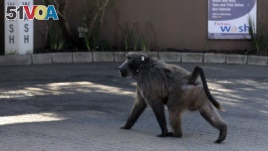25 September 2020
Kataza had a long record of criminal activity with Cape Town officials. So, when he organized a group of others to raid several homes outside the city, he was captured. Now, he sleeps at a local prison. But, there is a strong social media campaign that calls for his return.
Kataza is a baboon. He is one of a few hundred urban baboons who live around Cape Town. They often create problems when they invade homes looking for food. They knock over waste containers, steal fruit and vegetables from gardens, and cause all kinds of trouble.
Kataza's story is the latest example in Cape Town's ongoing problem of how to deal with the baboons. Normally, they live in the mountains that surround the city, but often they will come into town to look for food.

A baboon, named Kataza by locals, walks in Tokai, Cape Town, South Africa, Thursday, Sept. 17, 2020. . (AP Photo/Nardus Engelbrecht)
There are around 15 troops in the greater Cape Town area which number about 500 baboons, say local experts. The city even has a Baboon Technical Team. Wildlife rangers chase baboons away from some neighborhoods by shooting paintball guns at them. The most troublesome primates are sometimes put to death.
Kataza operated in the seaside village of Kommetjie, in southern Cape Town. After he was captured, rangers took him to the nearby area of Tokai. They hoped that he would become part of another, better-behaved troop and stop his troublemaking.
Activists, however, want him to be taken home and reunited with his own troop. "#BringBackKataza" reads a sign posted by a road in Kommetjie. There's a Facebook page calling for his safe return.
Kataza was unfairly singled out, said Jenni Trethowan. She runs Baboon Matters, a conservation organization in Cape Town that seeks ways for humans and baboons to peacefully co-exist. She wants him back in Kommetjie.
"He's no worse than any of the other baboons. He's just an urban baboon," Trethowan said.
Trethowan has spent many days observing Kataza since he was moved late last month. She said he has not joined the Tokai troop, is alone and appears to be unhappy. He now spends his days wandering through the streets, and his nights sleeping in the yard of a local prison.
"He lowers himself over the prison wall, or just ambles through the gate," she said.
Officials keep what they call "rap sheets" that list a baboon's bad acts and Kataza's was apparently extensive. They had watched him since April, when he raided five occupied houses. Officials decided to act after he led his troop on 15 raids through Kommetjie in July and August, they said.
A local newspaper reports that Kataza's "rap sheet" said: "He generally solicited other individuals to join him in raiding town."
Trethowan said the city is just blaming baboons for being baboons. Instead, Cape Town should take measures to ease the problem. Trash cans that baboons cannot get into would help, she said.
"Baboons are criminalized for things that baboons do normally," Trethowan added.
I'm Jonathan Evans.
The Associated Press reported this story. Susan Shand adapted it for Learning English. George Grow was the editor.
________________________________________________________________
Words in This Story
troop–n. a social group of some kinds of primates
rangers–n. a person who oversees and protects public lands and the animals in them
primates–n.(pl.) a group of animals that includes monkeys, apes and humans
amble–v. to walk slowly in a free and relaxed way
solicit–v. to ask for participation, help or money